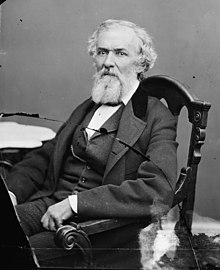Nicholas Trist
| Nicholas Trist | |
|---|---|
 |
|
| Born | June 2, 1800 Charlottesville, Virginia |
| Died | February 11, 1874 Alexandria, Virginia |
| Resting place | Ivy Hill Cemetery (Alexandria, Virginia) |
Nicholas Philip Trist (June 2, 1800 – February 11, 1874) was born in Charlottesville, Virginia and was the grandson of James Madison's former Philadelphia landlady. He attended West Point and studied law under Thomas Jefferson, whose granddaughter (Virginia Jefferson Randolph, 1818–1875) he married. He was also private secretary to Andrew Jackson, whom he greatly admired. Trist served as a conduit for James Madison to President Jackson.
Trist was appointed U.S. consul in Havana, Cuba by President Jackson. Shortly after arriving there in 1833, Trist invested in a sugar plantation deal that went bad. He made no secret of his pro-slavery views. According to members of a British commission sent to Cuba to investigate violations of the treaty ending the African slave trade, Trist became corruptly involved in the creation of false documents designed to mask illegal sales of Africans into bondage. For a time Trist also served as the consul in Cuba for Portugal, another country whose nationals were active in the illegal slave trade. Meanwhile, Trist became very unpopular with New England ship captains who believed he was more interested in maintaining good relations with Cuban officials than in defending their interests. Captains and merchants pressed members of Congress for Trist's removal. In late 1838 or early 1839, the British commissioner Dr. Richard Robert Madden wrote U.S. abolitionists about Trist's misuse of his post to promote slaving and earn fees from the fraudulent document schemes. A pamphlet detailing Madden's charges was published shortly before the beginning of the sensational Amistad affair, when Africans just sold into slavery in Cuba managed to seize control of the schooner in which they were being transported from Havana to provincial plantations. Madden traveled to the United States where he gave expert testimony in the trial of the Amistad Africans, explaining how false documents were used to make it appear that Africans were Cuban-born slaves. This exposure of the activities of the U.S. consul general, coupled with the angry complaints of ship captains, caused a Congressional investigation and eventual recall of Trist. (Neither Trist nor Madden is depicted in the film Amistad directed by Steven Spielberg, although there are brief Cuba scenes that suggest how the illegal slave trade was carried on there.)
...
Wikipedia
